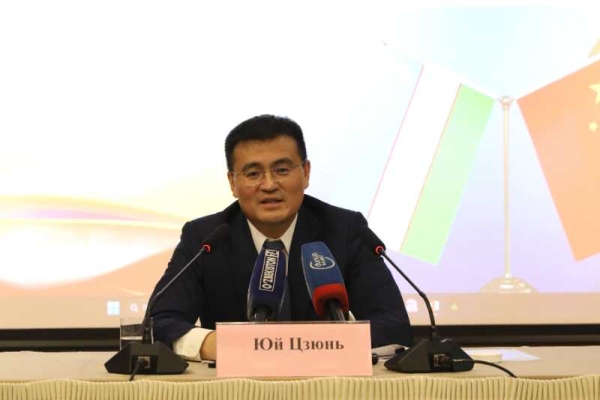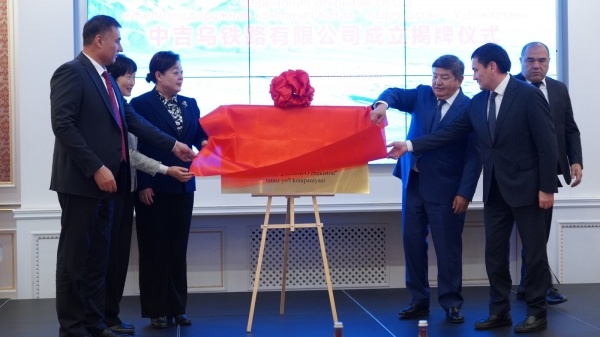China-Uzbekistan relations continue to expand, with trade between the two nations setting a new record of $14 bn in 2023 and already surpassing $8 bn in 9M24. This close partnership was highlighted at an event hosted by the Chinese Embassy in Tashkent, where Ambassador Yu Jun and representatives from leading Chinese companies discussed their efforts to boost Uzbekistan’s economic growth and shared plans for future cooperation across multiple sectors.
Ambassador Yu Jun Highlights Strategic Partnership
In his opening address, Chinese Ambassador to Uzbekistan, Yu Jun, underscored the value of China-Uzbekistan relations, stressing the essential role of the media in fostering mutual understanding. “The media plays an irreplaceable role in promoting objective information, spiritual values, and social progress,” he said. He further praised Uzbek media for opening a “window to the world and to China,” helping to bridge the nations through better understanding and collaboration.

Ambassador Yu also highlighted the significance of the Third Plenary Session of the 20th Congress of the Communist Party of China, where over 300 reform measures were adopted.
“The session has a historic impact, outlining comprehensive reforms to enhance the socialist system with Chinese characteristics and modernize governance,” he explained. These reforms, he noted, are focused on creating a fair and dynamic market environment, improving macroeconomic management, and promoting high-quality development.
On China’s evolving economic strategy, Yu added, “Our economy has transitioned from ‘high-speed’ to ‘high-quality’ development.” This shift is visible in China’s focus on advanced technologies like artificial intelligence, green development, and industrial modernization.
“China’s GDP for the first half of this year reached $8.7 trillion, marking a 5% growth over the previous year,” he shared, emphasizing that China continues to play a vital role in global economic stability.
Addressing Concerns Over Debt traps and Employment
Ambassador Yu also responded to concerns about the so-called “debt trap” often associated with Chinese investment, as well as the fear of job displacement among local workers. “The narrative of a ‘debt trap’ is a misunderstanding,” he stated firmly. “China is not a source of debt traps; we are a reliable partner helping developing countries achieve sustainable development.”
He explained that isolated cases where local communities had concerns were rare and did not reflect China’s policy or practices. “When issues arise, it’s often a misunderstanding, or sometimes funds sent to local administrations don’t reach the intended recipients,” he clarified.
Yu emphasized that the Chinese government actively regulates and monitors its investments abroad to avoid negative impacts. “China’s policy is not to allow private capital that might harm our image or the friendship between our peoples to operate unchecked. We even discourage private capital from going abroad if it cannot meet our standards of responsibility,” he said.
Reflecting on similar investments in Kazakhstan and Kyrgyzstan, Yu noted, “In Kazakhstan, for instance, we have over 3,000 Chinese companies, and only a small fraction have encountered issues. Most are working closely with local communities to provide mutual benefits.”
He acknowledged that misunderstandings occasionally arise, and stressed the importance of clear communication with local administrations to address them. “We work to ensure that our companies operate in a way that benefits the people, aligning with both Chinese and local interests,” he concluded.
Presentations from Leading Chinese Enterprises
Following Yu’s address, senior representatives from prominent Chinese firms—JV LLC China Construction Saisum, Qomolangma Energy International Group Central Asia, and SP LLC Peng Sheng—presented updates on their projects in Uzbekistan, illustrating China’s tangible contributions to the country’s development.
Su Jun, Deputy General Director of JV LLC China Construction Saisum, discussed his company’s infrastructure projects, stating, “Last year, our contracts worldwide amounted to around $600bn, with a significant portion in Uzbekistan.” Su noted that China Construction Saisum has been instrumental in building infrastructure across Uzbekistan, including roads, residential areas, and industrial facilities. “We are dedicated to supporting Uzbekistan’s infrastructure growth in alignment with its national goals,” he affirmed.
Li Feng, Deputy General Director of Qomolangma Energy International Group Central Asia, focused on the company’s energy projects. “Our Tashkent office oversees projects worth over $7bn, focusing on critical areas such as power lines, renewable energy, and infrastructure,” Li said. He emphasized the company’s commitment to sustainable development, adding, “We believe that energy infrastructure is key to Uzbekistan’s future growth, and we are here to ensure a reliable energy network across Central Asia.”
Abduvaliev Abbor, Deputy General Director of SP LLC Peng Sheng, described his company’s initiatives in agriculture and environmental protection. “For the past 15 years, we have been a leading force in Uzbekistan’s agricultural sector, working with private investments rather than state funds,” he explained. Abbor highlighted Peng Sheng’s coal factory, which he described as “the largest in the world for export,” and emphasized the company’s efforts to introduce environmentally-friendly technologies from Europe. “Environmental safety is a priority for us, and we aim to set new standards in Uzbekistan’s agricultural industry,” he added.
Expanding Cultural and Social Ties
Tourism was another key focus of the event, with Ambassador Yu expressing China’s enthusiasm for increasing travel between the two nations. “Uzbekistan has a rich and fascinating culture, deeply connected to the Silk Road. Personally, I believe that if one visits Central Asia, Uzbekistan is the first place to go,” he said, highlighting the country’s unique historical sites and cultural heritage.
He noted that Chinese tourists have shown growing interest in Uzbekistan’s landmarks, which has led to increased flight routes. “We have worked to expand flights to 100 trips per week from cities like Beijing, Xi’an, Chengdu, and Guangzhou,” he shared. Yu also hinted at plans to introduce additional routes, stating, “We are eager to offer even more flight options to facilitate easier access for tourists.”
Ambassador Yu acknowledged the potential economic benefits of expanding tourism, pointing out that a modest increase in Chinese visitors could make a significant impact. “If even a small percentage of China’s 170 mn outbound travelers visit Uzbekistan, it would bring immense benefits. Our aim is to see a million Chinese tourists annually coming to Uzbekistan,” he remarked.
To make this a reality, Yu underscored the need for cooperation in areas like pricing and accommodations. “More tourists, more flights, and lower prices—this will create a win-win situation for both countries, and we are working closely with Uzbek authorities to make this vision a reality,” he added.
Yu addressed common concerns regarding Chinese investments in Uzbekistan, specifically around job displacement and environmental impact. “China’s investments here are focused on sustainable growth and designed to benefit local communities,” he clarified, acknowledging that misunderstandings can sometimes arise. “We work closely with local governments to ensure our projects are welcomed and understood,” he added.
The China-Kyrgyzstan-Uzbekistan Railway Project

One of the most anticipated projects discussed at the event was the China-Kyrgyzstan-Uzbekistan railway, which is expected to enhance trade and connectivity across Central Asia.
Ambassador Yu expressed China’s commitment to seeing the project through, saying, “This railway will be a lifeline for economic growth, enhancing trade links not only within Central Asia but extending to the global market.”
The China-Kyrgyzstan-Uzbekistan Railway Company officially launched in Bishkek, Kyrgyzstan, on September 28, marking the start of a significant railway project to connect China, Kyrgyzstan, and Uzbekistan. Attended by key officials, including Akylbek Japarov and Du Dewen, the opening highlighted the project’s potential to strengthen economic ties and trade across Central Asia. This 523-km railway will link key regions and is projected to handle 15 million tons of cargo annually, with costs now estimated at $8 bn.
He emphasized the importance of regional integration, noting that “projects like these are essential for creating a cohesive economic network in Central Asia.”
Q&A Session with Journalists
The event concluded with a Q&A session where journalists had the opportunity to engage with Ambassador Yu and company representatives. Responding to a question about China’s influence in Uzbekistan, Yu emphasized, “China and Uzbekistan are long-term partners, and our collaboration is based on mutual respect and shared goals.”
He further added, “Our investments are meant to support Uzbekistan’s growth journey through transparent and sustainable projects, which align with the needs of the Uzbek people.”
Reflecting on the day’s presentations, Yu concluded, “China and Uzbekistan are poised for a bright future together. Our mutual respect, economic cooperation, and cultural exchanges lay the groundwork for a stable and beneficial partnership.”
He reinforced China’s commitment to supporting Uzbekistan’s modernization efforts, stating, “We are ready to work hand-in-hand with Uzbekistan to create a prosperous, sustainable, and interconnected future.”
Looking Forward
With more than 2,900 Chinese companies operating in Uzbekistan and a steady flow of investment into key sectors like energy, agriculture, and infrastructure, China’s role in Uzbekistan’s development is both substantial and growing. it is evident that the shared vision between China and Uzbekistan for a modern, economically robust, and socially connected Central Asia, with projects like the China-Kyrgyzstan-Uzbekistan railway promises to enhance regional connectivity.
As Ambassador Yu summarized, “China and Uzbekistan share common goals and a common path. Together, we are building a future that is prosperous, green, and interconnected for both our nations and the broader Central Asian region.”




